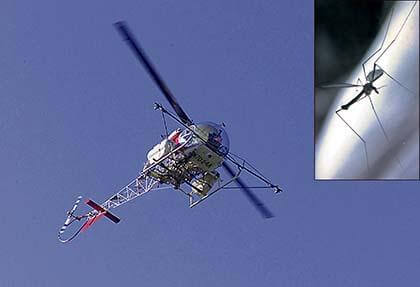By Rich Bockmann
Northeast Queens residents may be less pestered this summer and that could result in great benefits to their health.
The city Department of Health planned to use a helicopter to apply a larvicide to a trio of marsh and other non-residential areas this week in an effort to reduce mosquito populations and prevent potential exposure to West Nile Virus.
Areas inside Alley Pond Park, the defunct Flushing Airport and the Flushing River were to be applied with two larvicides — VectoBac CG and VectoLex CG — which contain naturally occurring bacteria, according to a department press release.
“These larvicides will also be used throughout the mosquito season to treat mosquito-breeding sites. Both products are approved by the U.S. Environmental Protection Agency and the state Department of Environmental Conservation,” the DOH said.
These marshy, natural areas are common breeding grounds for mosquitoes, and now is the time mosquitoes are starting to breed, laying hundreds of eggs in bodies of standing water. The DOH said the size and inaccessibility of these areas required the use of a helicopter to apply the larvicide.
West Nile is a mosquito-borne virus that can infect humans, birds, horses and other mammals. It can cause flu-like symptoms or, in some cases, death. The first mosquitoes carrying the virus in the United States were found in Queens, and in 1999 the virus spread to dozens of people and birds in the northeast section of the borough, nearly wiping out the crow population.
By September 1999 the city had started extensively spraying Queens with pesticides in an effort to curb the spread of the virus by killing the adult mosquito population. After the first cases were initially reported, the virus spread across the country, peaking in 2003 when the U.S. Centers for Disease Control reported nearly 10,000 cases nationwide.
Last year, the department recorded 42 cases of the virus — the largest number since the outbreak of 1999 — though the fatality rate was 3 percent, compared to a high of 23 percent in 2003.
Standing water is a violation of the city Health Code, and the DOH urged residents to clean and chlorinate their pools and eliminate standing water in gutters, pool covers and other containers. The department suggested residents may use approved insect repellents containing DEET, picaridin, oil of lemon eucalyptus — not for children under age 3 — or products that contain the active ingredient IR3535 in order to deter the insects, which are most active from dusk through dawn.
Reach reporter Rich Bockmann by e-mail at rbockmann@cnglocal.com or by phone at 718-260-4574.


































